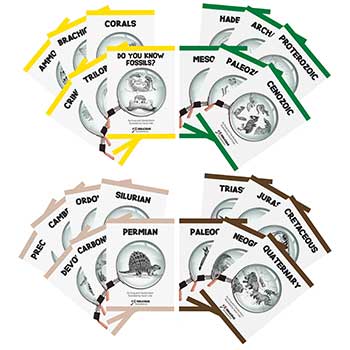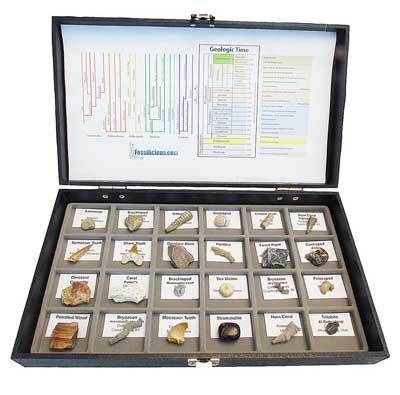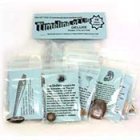Sign up for Lesson Plans, discounts & more!
Allosaurus
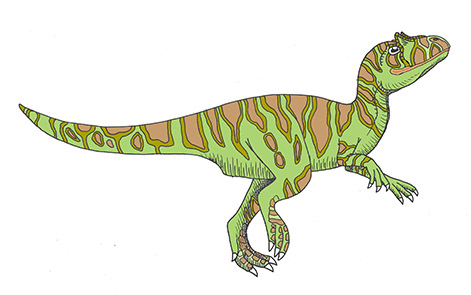
To the untrained eye, Allosaurus could easily be confused with Tyrannosaurs Rex. These two dinosaurs have a similar look about them. In fact, to dino-lovers, they are the two most recognizable meat-eating dinosaurs. Both were theropods, which means they were bird-hipped and walked on two legs. They also had big skulls full of sharp teeth perfect for tearing flesh. Eek!
However, the similarities stopped there. Allosaurus lived during the Late Jurassic Period, about 155-150 million years ago and roughly 100 million years before T-Rex. Another difference between these two carnivores was in their hands. T-rex had only two fingers while Allosaurus had three. This Jurassic predator was also quite a bit smaller than the T-Rex, only averaging about 30 feet tall and weighing between 2 and 3 tons. This was quite a modest size for a dino; some paleontologist might even consider it small. Imagine a world where 30 feet is SMALL!
The Allosaurus Timeline
Mesozoic |
||
Triassic |
Jurassic |
Cretaceous |
Dinosaurs’ names, including Allosaurus, were often derived from the Greek language. Allosaurus means “different lizard” due to the unique shape and markings of its vertebrae. As previously stated, this dinosaur walked on two legs. Its front legs were significantly shorter and most likely used to tear flesh. Speaking of tearing flesh, it also had some pretty sharp saw-like teeth!
Allosaurus had between14 and17 teeth on both the top and bottom jaws. The teeth were replaced continually: as a tooth feel out, a new one grew in its place. This was true for many of the meat-eating dinos and makes teeth one of the commonly found fossils. Some plant-eating dinosaurs, including Triceratops, also experienced tooth regeneration.
Name |
Allosaurus |
Classification |
Theropod |
Food |
Carnivore |
Length |
28 feet |
height |
30 feet |
weight |
2-3 tons |
Range |
Western North America |
Time Period |
Late Jurassic Period |
Allosaurus was a carnivore and preyed on some very large animals. Fossil evidence leads paleontologists to believe that Allosaurus frequently attacked Stegosaurus. What makes them think this? First, Stegosaurus fossils have been found in similar rock strata indicating they lived about the same time and place as the Allosaurus.
But there is other evidence, too. Scientists find fossils that show evidence of attacks and wounds. Allosaurus tail vertebra have been found with a partially healed wound that fits a Stegosaurus tail spike, while a Stegosaurus neck plate with a U-shaped wound that correlates well with an Allosaurus snout have also been found. Imagine the battles!!
Allosaurus had a short pair of horns, used in combat, and probably as a symbol of dominance. These horns may even have been able to shade their eyes from the sun. How handy, built-in sunglasses!
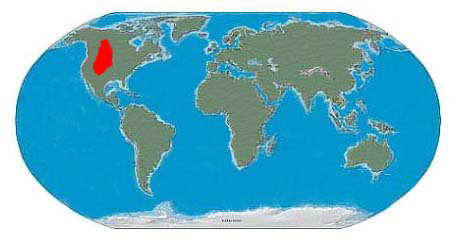
Allosaurus fossils are found in the Western US.
The first discovery of Allosaurus bones was in Western Colorado during the Bone Wars in the late 19th century. The Bone Wars, also called the Great Dinosaur Rush, was a fossil hunting competition between paleontologists Edward Drinker Cope and Othniel Charles Marsh. These bone bullies would use extremely sneaky, cruel and, as some would say, childish tactics to sabotage the other. When all was said and done, the naming of this famous fossil went to Marsh. But don’t worry, Cope found and named plenty of fossils, more than 1000, including the Dimetrodon.
Back to Dinosaur Central
Back to Dinosaur Teeth For Sale
Check out some of the Educational Materials for sale on our sister site fossilicious.com.

interested in more? If so, you may want to check out our other sites:
fossilicious.com - Our online fossil and mineral rock shop.
rocksandminerals4u.com - An educational site about rocks, minerals, and geology.
Geologic Time Geologic Time Line
Cenozoic Era
Quaternary
Neogene
Paleogene
Mesozoic Era
Cretaceous
Jurassic
Triassic
Paleozoic Era
Permian
Carboniferous
Devonian
Silurian
Ordovician
Cambrian
Archean Time
Hadean Time
Teachers Resources
Activities for Education and Fun
Earth Science Lesson Plans
Activities For Kids
Fossil Lesson Plans
Fossil Activities
Education Articles
Coloring Pages
Dinosaur Coloring Pages
Montessori Materials
Geology Club
Fossil Hunting
 |
 |
 |
